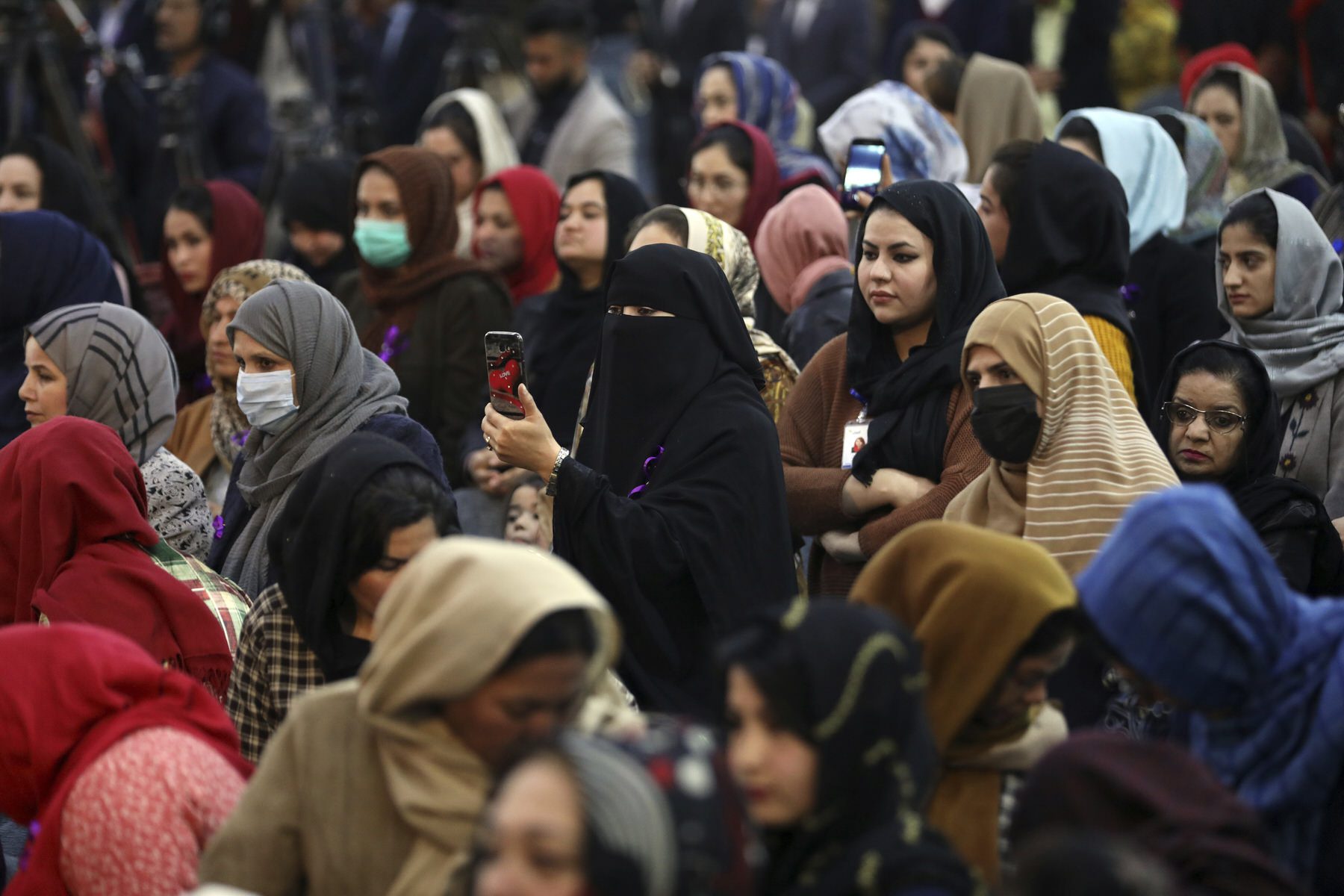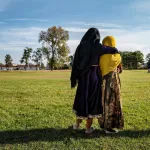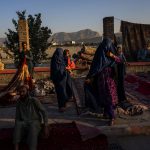This article has been updated.
Two decades of fighting in Afghanistan have brought a handful of themes to the fore for Americans. Chief among them: the progress Afghan women and girls made in society after years of Taliban rule banned them from public life.
Now, weeks from the 20th anniversary of the September 11 attacks, which first led to the United States invading Afghanistan, the Taliban are back in power.
As the U.S. continued to evacuate from Afghanistan on Monday, President Joe Biden said he stood “squarely behind my decision” to withdraw American troops, a move previously agreed upon with the Taliban. The Afghan government fled and its military fell apart “more quickly than we had anticipated,” Biden admitted, but he argued there was never going to be a “good time” to leave.
“American troops cannot and should not be fighting and dying in a war that Afghan forces are not willing to die for themselves,” Biden said. Human rights, including for women and children, “must be the center of our foreign policy,” he added.
House Speaker Nancy Pelosi on Saturday called for protecting the safety of women from any “inhumane treatment” as the Taliban’s grip continues to grow.
“The fate of women and girls in Afghanistan is critical to the future of Afghanistan,” Pelosi said in a statement. “As we strive to assist women, we must recognize that their voices are important, and all must listen to them for solutions, respectful of their culture.”
The oppression of women under Taliban rule was well known even before 9/11. When the Taliban took over Afghanistan in the late 1990s, reports quickly followed of women being beaten if they left their homes unaccompanied by a man from their family. Girls were banned from getting an education.
Recently, many Afghan women have taken to social media to call for international help as they watched their government cede power to an extremist group that would send them back into silence.
Ned Price, a State Department spokesperson, said on Monday that the United States is watching the Taliban’s actions closely and will not support a government that doesn’t uphold the basic rights of its people — including its women and girls.
Nearly 400 Afghan women leaders and activists from across the country wrote an open letter to the Taliban in 2020 calling for an end to violence.
“In the last two decades, we have played a vital role in rebuilding our destroyed country,” the coalition wrote. “We have done so as scientists, doctors, technologists, entrepreneurs, judges, religious scholars, engineers, lawyers, teachers, university professors, security officials, journalists, artists and rights activists across the country. We will not allow our place and contribution towards rebuilding our country to be erased or reversed.”
Mahbouba Seraj, a prominent Afghan women’s rights leader, said the world should be ashamed for what is happening in her country.
“All of these men of the world in power are destroying something that we’ve worked so hard for,” Seraj said in an interview with a Turkish television station. “What is happening in Afghanistan today is going to put this country 200 years back.”
A university student in Kabul described to Rukshana Media — an all-Afghan women led newsroom that partnered with The Guardian — a chaotic scene that unfolded when the Taliban arrived. On her way to class on Sunday morning, the student said a group of women ran out of the dormitory and told her police were evacuating them because the Taliban would likely beat them for not wearing burqas in public. Nearby, she added, some men mocked the women and warned them it would be their last days on the streets. On her way home, she noticed the photos of women that decorated the front of a beauty salon had been painted over.
What is happening in Afghanistan today is going to put this country 200 years back.
Mahbouba Seraj, an Afghan women’s rights leader
“As a woman, I feel like I am a victim of this political war that men started,” the student said. “I felt like I can no longer laugh out loud. I can no longer listen to my favorite songs. I can no longer meet my friends in our favorite cafe. I can no longer wear my favorite yellow dress or pink lipstick.”
For months, women and girls have borne the brunt of the conflict between government forces and the Taliban.
The United Nations issued a report in February detailing how the conflict impacted civilians in Afghanistan in 2020. Women and children accounted for about 43 percent of all civilian casualties, the report said, and a record number of women were killed.
On Sunday evening, the Department of State and Department of Defense issued a joint statement that said nearly 6,000 troops will be in Afghanistan within 48 hours to help American civilians and officials. Thousands of American citizens, locally employed staff that assisted the United States and other “particularly vulnerable Afghan nationals” scrambled to secure safe departure from Hamid Karzai International Airport. It is not clear how many women and children will be evacuated.
Biden put Ambassador Tracey Jacobson in charge of processing, transporting and relocating Afghan special immigrant visa applicants and other Afghan allies, according to a statement released over the weekend.
The State Department said it would also “accelerate” the evacuation of thousands of Afghans already eligible for U.S. Special Immigrant Visas. Nearly 2,000 and their families have already made their way to the U.S. in recent weeks, the statement said.
More than 300,000 Afghan civilians have been affiliated with the U.S.’s mission in Afghanistan, but only 16,000 Afghan special immigrant visas have been issued since 2014, according to the International Rescue Committee. In the past, Afghans have had to wait years to complete the application and approval process.
Upon arrival, many refugees go through one of the nine national resettlement agencies. One, the Episcopal Migration Ministries (EMM), resettled more than one thousand refugees last year — of which 24 were from Afghanistan.
The United States Conference of Catholic Bishops (USCCB), another resettlement agency, has worked with the State Department and the Office of Refugee Resettlement to resettle Afghan refugees since the program was created. When the first flight of Operation Allies Refuge arrived in the U.S. in July, Archbishop José Gomez, USCCB president, and Bishop Mario Dorsonville, chairman of the conference’s migration committee, applauded Congress’s resettlement efforts and welcomed the Afghans.
“Each of these individuals have put their lives and those of their family and friends at risk,” the bishops said in a statement. “As they now leave everything behind to begin new lives here, the many sacrifices they’ve made should not go unacknowledged.”
Kristen Rouse, a veteran who served in Afghanistan, said in an interview with CNN that many American veterans are receiving messages and goodbye notes from the Afghan interpreters that worked alongside them.
“It’s a sense of betrayal,” Rouse said. “I had an Afghan interpreter message me today: ‘Dear sweet sister, the Taliban are in my village. I am about to die. I know who you are; you are for us. But your government is killing us.’”
Each year, the president and Congress establish a maximum number of refugees that can be admitted. The Trump administration lowered this refugee ceiling from 30,000 to 18,000 in fiscal year 2020 and 15,000 in 2021. The Biden administration said it would raise the ceiling to 125,000 in 2022.
In 2020, about 5 percent of all admitted refugees to the U.S. were from Afghanistan. And women accounted for nearly half of refugees from all countries.
The United States has disbursed more than $787.4 million to support programs specifically intended to empower Afghan women and girls, according to a February report published by Special Inspector General for Afghanistan Reconstruction, an independent agency created by Congress. This amount doesn’t include hundreds of programs and projects that indirectly helped women.
With high maternal mortality rates, widespread gender-based violence and limited access to education and health care, Afghanistan remains one of the most difficult places for women.
Despite this, considerable progress has been made since 2001. As of 2021, 3.5 million girls were enrolled in school, comprising nearly half of all students. And about one-third of the country’s teachers were women — a significant number given two decades prior, women were barred entirely from working as teachers in government schools under the Taliban. Unprecedented numbers of women were elected to office, the number serving in the police increased from 180 to 3,650 within 14 years, and as of January, women had made inroads in the Afghan National Army, although they still held less than 1 percent of uniformed positions.
This is all likely to come undone. The path to the government’s unwinding was long, with its most recent chapter beginning a few years ago.
The Trump administration began talking to the Taliban in 2018, which eventually led to formal negotiations. In February 2020, the former administration signed an agreement with the extremist group that called for a full American withdrawal from Afghanistan by May 1.
Biden later extended that deadline. The deal was intended to allow the Taliban and the Afghan government to come to a peace agreement and forge a path forward for Afghanistan.
In April, Biden announced that all of the remaining American troops would be out of Afghanistan by September 11 — the 20th anniversary of the terrorist attacks that sparked the War on Terror.
The pullout continued, most notably with the closing of Bagram Air Base in July. Then, it all came crashing down. On August 5, the Taliban did not have control of a single one of Afghanistan’s 34 provinces. Within 10 days, the Afghan President Ashraf Ghani had fled the palace and the militant group had taken Kabul — the country’s capital and largest city.
In a February 2020 opinion piece published in the New York Times, the deputy Taliban leader, Sirajuddin Haqqani, said that under Taliban rule, all Afghans will have equal rights, “where the rights of women that are granted by Islam.” These rights include access to education and work; however, experts and advocates are wary of the group’s interpretation of those rights given their track record. And early indications suggest women are already being erased from the public consciousness.
Dr. Habiba Sarabi, Fawzia Koofi and Sharifa Zurmati — three Afghan women members of the Afghan negotiations team that engaged in peace talks with the Taliban — cautioned that peace should not come at the expense of the humanity of more than 14 million Afghan women.
“We press on because we know that an inclusive Afghanistan is the only path to a lasting, just peace and end to the war,” the three women wrote in a CNN opinion article published in April. “We are not alone: Women of all walks of life do not want to return to an era in which their fundamental rights counted for nothing.”






